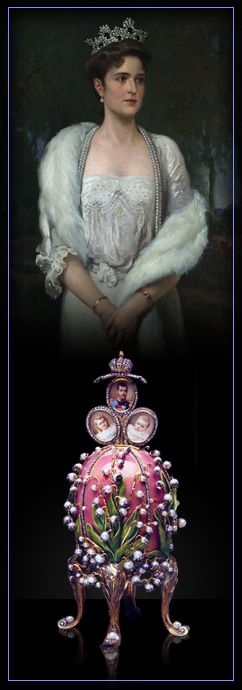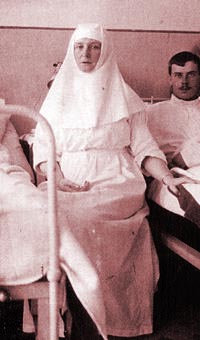Why a web page may look different on different computers. This article that was written by Walt and is on the Pallasart site.


 Chapter XXThe Empress's War Work, 1915At the end of 1914 and the beginning of the following year the Empress again had a moment of great popularity. Even people who were not in sympathy with her admitted this; for instance, the Minister for Foreign Affairs, S. D. Sazonov, spoke of it to me on one occasion when I was lunching at the Foreign Office in 1915. The Empress travelled about, she was seen in public, her work became known. "One must take things personally in hand," she had written to Princess Louis on March 23rd, 1915. New ideas were always working themselves out in the Empress's brain. The days were too short for her. The Empress wrote to Princess Louis on March 23rd, 1915: My heart got so bad again, there was lots of work, and it helps me when the heart is heavy and, knowing you bring happiness, how not go to the poor wounded? and forget yourself? My day was like that: at 9:30, a second into the Znamenya church to get my blessing for the day's work, then with Olga to the Big Palace to see a very seriously wounded officer (through the lungs). At 10 Tatiana fetched us (after her lesson) and they dropped me at Ania's. At 10.30-1, we worked at our hospital, with officers and men, and operations, rather often appendicitis, etc., too. Then I would go and sit with that poor officer again, for an hour or more, then pass through the other wards. After tea rested, if did not have audiences or officers to bid goodbye, before returning to the war. After dinner, off to Ania or to the hospital, or to both according to necessity. Now my poor officer died, and that finished me off, besides had to go to town to a hospital, and so on.The Empress does not say that, besides all this, she looked through the papers her secretary sent her till late at night, and began to work at them again, early in the morning, before going to her hospital. There was sometimes no chance for the Household to see her, except at lunch, and she usually had her ladies on business at that time. It was evident that such feverish activity could not be kept up long by a woman so delicate as the Empress. Only sheer will-power kept her going during the first five months of the war. She fell ill in December 1914. Heart trouble reappeared, caused by the long standing and the real, hard physical work to which she was, naturally, unaccustomed, and by the motoring, which had always disagreed with her. Added to this was the mental strain of continual contact with suffering, in which she was always spending herself whole-heartedly in helping and comforting others. She roused herself at the time of her friend Mme. Vyrubova's illness in January 1915, but afterwards had a serious setback, and could not leave the Palace for several weeks. She went on intermittently with her hospital work, being loth to give it, up entirely, but she could stand it less and less. She hated to admit that she was beaten by her health, but in 1916 she was completely worn out. The Empress Alexandra Feodorovna wrote to her sister that she was determined not to be "a mere doll." Every official in her trains near the fighting line could telegraph to her personally, reporting his movements and appealing to her in cases of difficulty. If action had to be taken promptly, the Empress telegraphed herself, stating the case and asking for the necessary measures to be taken as soon as possible. She hated formality and red tape, and she felt that the interests of the wounded should always come before everything else. Personal sympathies or antipathies did not influence her in her work. The heart trouble that at first had been only a nervous affection then became really serious. She had constant pain and a feeling of suffocation, while almost chronic facial neuralgia had taken the place of the sciatica from which she used to suffer so badly. On account of her heart trouble she had to submit reluctantly to be carried upstairs in the hospitals she visited, though she loathed " making a spectacle of herself." The organization known as the "Union of Towns did very useful work, with the assistance of the Zemstvos but the Empress was rather distrustful of them, as she had heard that much political propaganda was carried on under cover of their war activity. One of their chief leaders was Purishkevitch, the future murderer of Rasputin. The Empress referred to him in a letter to me: Please let X know that Purishkevitch asks for ten thousand pieces of body linen for the Dvinsk, Riga and Minsk front. Have arranged baths and that linen is urgently needed. Have arrived to-day, leaving to-morrow. It's good to give Purishkevitch as much as one can, as he really works well. I several times helped him. Tell them to answer at once - he is in town.Though, naturally, she did not correspond with her relations in Germany, the Empress thought of them often with sadness. It was a great comfort to her to know that the Grand Duke of Hesse and his armies were not fighting on the Russian front. She wrote to Princess Louis on November 25th, 1914: To-day is our Ernie's birthday, the first time in his life that three sisters can give him no news. How lonely he must be away from his dear ones, in a foreign country and hating the war. . . . One's heart bleeds, thinking of all the misery everywhere and what will be afterwards! The amount of lies, printed in the German papers (and in Turkey), is sickening. The fright of the German prisoners that they were going to be shot, and noses and ears chopped off, and their surprise and contentment, when they are well treated and fed, are great. Ella will return in a few days from Lvov [Lemberg].She wired that she was in the Carpathian, that there was snow in Lvov and bitterly cold. Contented with what she saw and my sklad there and my four sklad trains working. Nearly all the male members of the Russian Imperial Family were with the army. All the Grand Duchesses either had sklads or worked in the hospitals. The whole Court lived in a war atmosphere, everything being coloured by the news from the front. The disaster of Seldau was a terrible blow, relieved to some extent by the Marne victory. The Empress writes on October 21st, 1914: One's heart bleeds, such misery, such losses. The worst is, when one cannot get the news about the losses for ages. From home, no news, of course. Mavra I returns to-morrow, after burying her poor son, Oleg. It's one's consolation to be with the wounded and dress their wounds and look after them. All are well here. Ducky 2 is out with Miechen's 3 sanitary train, not as a nurse but to look after all, and works well. Olga 4 and Marie 5 are still out in the hospitals.When the Emperor was away, as he frequently was, reviewing troops and visiting munition factories, the Empress with her daughters and a lady-in-waiting went on tours of inspection to provincial hospitals; These were often long journeys, and although the Imperial train was very comfortably fitted up, it was no small undertaking. In 1914-1915 the Empress visited more towns than ever before during all her years in Russia. She wanted to see for herself how things could best be improved, and to show her personal interest in as many wounded as possible. She would have liked these to be surprise visits, in which she could dispense with ceremony and see things thoroughly, and this was managed several times in Petrograd. But on longer journeys, it was pointed out to the Empress that it would not be fair for some people who might have worked untiringly in the hospitals not to know of her visit, as they might perhaps just happen to be away on the day she came, if her visit was a surprise one. The thing that the Empress hated most of all was to feel something was being hidden from her, that she was being shown some "Potemkin " villages. On one occasion it was evident that she was not wanted to see a particular hospital in one of the towns she visited. She was told that the hospital was too far, that the road was impossible, and that there were scarcely any patients in it. The Empress replied that a few would be as much pleased to see her as a number. At last she was told that the bridge on the river was impassable, and as this excuse was corroborated, she had to give in. She sent her gentleman to " ford " the river, should this prove necessary. The bridge was under repair, but this was the only story that proved true, and the hospital was not one of the glories of the town. The Empress went with the Emperor to Dvinsk and Grodno, and they also made a tour of the central towns, the Empress meeting the Emperor on the way-he had been inspecting some troops. In every town they made a tour of the hospitals, seeing the wounded, the Empress lingering near specially bad cases. Sometimes they saw as many as 3000 men in a day. Even when she was without the Emperor she had great ovations in nearly every town. At Kharkov, for example, the students gave her a rousing welcome, and her car could scarcely move through the wildly cheering crowd. Later in the war the welcome was more stilted and formal, but the Empress did not seem to notice it. Only once did she feel some coldness in her reception, and this was in Moscow, the first time she went alone there in 1914. She had the Governor informed that the visit was a private one and that she wanted to visit the hospitals under the Grand Duchess Elizabeth's guidance. The Empress and her daughters wore nurses' dresses, and the Governor let it be known that the Empress had come incognita. No one in the town knew of her arrival, the streets were mostly empty, and those who met Her Majesty did not recognize her. She felt hurt, and thought that it was the result of some intrigue against her. The pleasure she believed she was giving kept the Empress going all the time, but she would come back to the train so tired that she could only sink down on the first chair in utter exhaustion, unable even to go to her own compartment. She allowed herself no respite; even when ostensibly resting she would be looking through the innumerable petitions she received in every town till her daughters would entreat her to stop. When she saw an ambulance train at any station, she would +row a coat over her rest gown and rush out to inspect it. She thought that people would feel slighted if they saw the Imperial train and she did not go and see them. She never shrank from the overcrowded carriages or the saddest sights, and would stand in the close atmosphere, her face on a level with the upper rows of bunks, while the doctors gave her a detailed account of their work. She drove in some curious and impromptu vehicles in many of the towns. Sometimes a car was placed at her disposal, sometimes the antique coach of an archbishop, sometimes even the homely isvoztchik (cab). Outward displays seemed to her needless, and even wrong at such a time. Her desire to pass unnoticed was sometimes disappointed. I remember a case in point, when the Empress stopped for a couple of hours at Bielgorod, on her way from Kharkov. There was a monastery there well-known place of pilgrimage - which she wished to visit. She wanted no one disturbed on her account, as the train passed Bielgorod in the evening. No one in the town knew of her arrival. With her daughters, General Ressine, Mme. Vyrubova and myself, she set off in the very worst possible isvoztchik over muddy, bumpy roads in the pitch darkness to the monastery. Great was the Empress's disappointment to find the whole monastery brilliantly lighted and the sleepy Archbishop in full vestments preceded by equally sleepy monks bearing lighted tapers I Someone had evidently raised the alarm. The Empress was led in procession from her humble conveyance, the Archbishop respectfully holding her arm, to the church, where a solemn Te Deum was chanted. Her mischievous daughters were much amused at their mother's "unobtrusive " visit, but most of all at the appearance of the conveyance, drawn up with great dignity for our departure! There were no German prisoners at any of the hospitals their Majesties ever went to, as these were mostly in hospitals set apart especially for them; but at Dvinsk they saw some German civilians who had been taken prisoners by the advancing armies. Among them was a man of about 80, who threw himself on his knees before the Emperor and begged for his liberty. The old man looked like an ancient patriarch with a long flowing beard; the people with him, women and children, were all his family. The Emperor at once gave the order for his release, and he was sent back to the German lines. All the winter of 1914-1915 there was not much movement on the Russian front; but the Empress personally had a strenuous time, for Ania Vyrubov was the victim of a terrible railway accident which left her lame for life. Mme. Vyrubov had both legs broken, her spine injured and her skull fractured. The Empress scarcely left her side for the first three days after the accident, though she was herself in a very poor state of health. The Empress was torn at this time in many directions, as there were serious cases in her hospitals, who also wanted her, and she was continually on the road from one sick bed to the other ; but she wrote on March 23rd to Princess Louis that "the wounded's grateful smiles are a recompense for every fatigue." In March 1915 Lvov was taken and the Austrian fortress, Przemysl, fell. This was hailed with delirious joy by the country. In the same letter of March 23rd to Princess Louis, the Empress wrote: Such gratitude fills one's heart, that Peremyschel [sic] has fallen at last. Now one can breathe freer, as it kept many troops, which we needed to send elsewhere. Thank God, on all sides the news is better and in France too. One's heart suffers for the ships in the Dardanelles-such an ignoble way of fighting. I loathe these mines. Three minutes and all over-brave souls. How glorious, when St. Sophia will be again a Christian church, if we live to see it.To Miss Jackson she wrote: TSARSKOE SELOThe Emperor went to the two Galician towns very soon after their capture. The Empress was at first a little dubious about this, though she would not admit that she had tried to dissuade him from going there so soon. And when she wrote to Princess Louis on April 30th she said: Nicky was at Lvov and Peremyschel - most interesting. He has not yet returned as he went to Odessa, Sebastopol to see the troops, dockyards, etc. We expect him back in about 5 days.To the same she says later: I would to God, that this hideous bloodshed would end - but it is too early. The work is not yet done, and they still underrate us. One day they advance, the next we, and on the other side too.And a week later: How too outrageous the sinking of the Lusitania. There are things one cannot understand (May 11, 1915).During the war the Empress and her children stayed the whole year round at Tsarskoe Selo, as a change of residence would have interrupted the hospital work. The Empress spent few hours actually nursing, but still went to her hospital. One hears an echo of the operating theatre in a letter to her sister, May 11, 1915: An officer died on the table. A very difficult operation succeeded, then the heart gave way. Hard such moments, but my girlies must know life, and we go through all together.She wanted to arrange sanatoria for the wounded in the Russian watering-places, which were splendid "but primitively arranged."She was tied to her sofa mostly now, but new ideas were always taking shape, and her old charities had to be attended to as well. She was keenly interested in the development of the "School of Popular Art" I she had started, and the newly-founded "Society for the Protection of Mothers and Infants," which united all infant welfare work in the country. In the summer of 1915 the Empress had a call on her sympathy in the Imperial Family, for the Grand Duke Constantine died on June 18th. The Grand Duke was a man of great culture and a well-known poet. He had been very hard hit by the war, as he had lost a promising young son and his daughter a very gallant husband. The Grand Duke's death came at a time when events on the Russian front had taken a serious turn. The Empress's letters show her anxiety. After the Galician successes of the winter and spring, the Germans came to the assistance of their allies. General von Mackensen attacked the Russian armies, which had to retreat all along the line it had cost such efforts to take. The shortage of munitions and the rapidity of the Russian advance in the winter were largely responsible for this. On all sides the news was bad.' The Empress spoke of the uncertainty of the fortune of war, but the losses greatly depressed her. She began to feel, like the rest of the country, that something was amiss. Her letters are full of the losses, and she wrote once that nearly all her Siberian rifle regiment had been gassed. Things got worse towards the autumn. One fortress after another fell. The Empress clung to the crumbs of comfort: the fortresses were old, and the loss of life was small. Still, her letters breathe the anxiety she had for those around her, to whom she always showed a brave face. On August 31st, 1915, she wrote to Princess Louis: They are advancing at great speed. Our misery, the lack of rifles and heavy artillery, like theirs. They bring more and more to our side. Will England and France never help us ? We leave the fortresses, nothing can withstand 16inch guns old fortresses after all - and to lose lives uselessly is no good. The further they come the worse for them-the getting out. Must hope for an early, cold winter. We were not prepared for war and they were thoroughly, and then, they are splendid at organizing things, laying lines and so on, but God will help! The misery of the thousands of fugitives, who block up the rear! One does what one can for them, but the quantity is so colossal.There were fears for Petrograd at one time and it was suggested that the collections of the Hermitage should be taken to Moscow, but this was vetoed by the Emperor, who knew what a panic it would cause. Public opinion became still further disquieted. Someone had to be the scapegoat for the reverses, and the hatred of the moment fastened itself on the Minister of War, General Sukhomlinov. He had assured the Cabinet at the memorable sitting at the outbreak of the war that he could fulfil all demands, but he had underestimated the actual supplies of war material. A commission of inquiry was appointed by the Emperor, and General Sukhomlinov was dismissed, though the charge of high treason was disproved by the judgment of the court. General Polivanov was appointed Minister of War in his stead, but this did not solve the imminent problem. The retreat was going on. What was to be done to sustain the morale of the armies? |
|
Alexandra Feodorovna was the last Romanov Empress of Imperial Russia. This online book - The Life and Tragedy of Alexandra Feororvna was written by Countess Sophie Buxhoeveden, Lady-in-Waiting to the Empress, who served the Empress for many years and followed the Imperial family into exile. |

- Early Surroundings
- Childhood
- A Young Princess
- Engagement
- Marriage
- Her New Home
- Coronation
- Journeys
- Charities and Life
- Queen Victoria
- Foreign Trips
- Birth of Alexis
- Gathering Clouds
- On the Standart
- Rasputin
- Her Family
- Empress at Home
- Last Years of Peace
- Wartime 1914
- War Work
- Without the Emperor
- Visits to Headquarters
- Before the Storm
- Warning Voices
- Rasputin's Murder
- Revolution 1917
- Abdication of the Emperor
- Prisoners
- Five Weary Months
- Tobolsk
- Ekaterinburg 1918


 Left: The Empress working in one of her hospitals.
Left: The Empress working in one of her hospitals.


